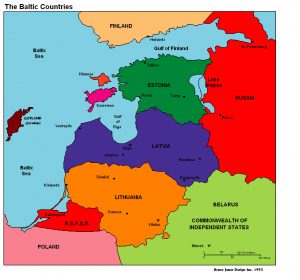In 1890 Germany’s “Iron Chancellor,” Otto von Bismarck claimed: “If there is ever another war in Europe, it will come out of some “damned silly thing in the Balkans.” Of course, Bismarck was correct, and we plunged into the collective darkness of WWI, which historians widely agree was preventable, an unnecessary slaughter of youth and potential. Now, 130 years later, as tensions with Russia escalate over cyberattacks, aggression against Ukraine, and allegations of election meddling, we may be facing another “damned silly thing,” this time in the Baltics.
The Baltics are comprised of the states, or countries, Estonia, Latvia, and Lithuania. Named for their proximity to the Baltic Sea, these countries only recently gained their independence in 1990, when the Berlin Wall fell, touching off the eventual collapse of the Soviet Union. All three today are parliamentary democracies. And although the recent focus of the Biden Administration has been on Russia’s (and China’s) nuclear programs, some experts are more worried about what they see as the fragile condition of democracy and freedom in this European region, and our wider relations with the European Union (EU) and, more importantly, from a military perspective, the North Atlantic Treaty Organization (NATO).
Ulrich Kühn, head of the Arms Control and Emerging Technologies Program at the Institute for Peace Research and Security Policy at the University of Hamburg (IFSH), and a Nonresident Scholar with the Nuclear Policy Program of the Carnegie Endowment for International Peace, is one of those experts. In his in-depth publication Preventing Escalation in the Baltics: A NATO Playbook, Kühn warns that the threat of conflict between NATO and an increasingly aggressive Russia poses an existential global threat, one that could mire us in global warfare, or even, worse, nuclear confrontation. Kühn contends:
The risk of escalation sparking a wider conflict—deliberately, inadvertently, or accidentally—between Russia and NATO is dangerously high. This is particularly the case in the Baltics, a region that would be difficult for NATO to defend because the military balance there very much favors Russia; moreover, Moscow could instigate unrest among the Russian minorities living there. To mitigate these risks and remain united, NATO members must complement deterrence with resilience and risk-reduction measures better tailored to addressing Russian behavior below the threshold of outright conventional and nuclear conflict.

Essentially, Kühn recommends an overall policy that threads the needle between striking an effective defensive posture while simultaneously not provoking retaliatory measures by Russia. Kühn frames the issue this way: “If NATO underestimates the threat Russia poses, the alliance may give Moscow reason to test its resolve—perhaps even by using military force. Conversely, if NATO overestimates the threat emanating from Russia, its well-intentioned defensive measures may lead to a security dilemma that precipitates an arms race and ultimately undermines alliance unity.”
Where does the United States, in particular, the Biden Administration, fit in with this dynamic? In his recent meeting with NATO heads in Brussels, Belgium, Biden had this to say: “NATO is — Article 5, we take as a sacred obligation. And I constantly remind Americans that when America was attacked for the first time on its shores since what happened back in the beginning of World War Two, NATO stepped up. [Fact check: NATO was not formed until 1949, almost 4 after the end of WWII.] NATO stepped up and they honored Article 5. And I just want all of Europe to know that the United States is there. The United States is there.”
Yet, as a chilling reminder of what is at stake, NATO Secretary General Jens Stoltenberg countered, the NATO-Russia relationship, “is at its lowest point since the Cold War, and Moscow’s aggressive actions are a threat to our security.”
These claims must be put into the context of the strained relationship the United States had going into 2021, primarily because of the policies of outgoing president Donald Trump. In reaction to what he saw as unequal contributions by multiple NATO member states, in late 2019, Trump moved to reduce contributions to NATO, “. . .dropping its total from providing 22% of NATO’s direct funding down to 16%, putting it more in line with Germany, which provides 14.8%.”
Trump’s rhetoric, via Twitter, didn’t help matters either. “What good is NATO if Germany is paying Russia billions of dollars for gas and energy? Why are there only 5 out of 29 countries that have met their commitment? The U.S. is paying for Europe’s protection, then loses billions on Trade. Must pay 2% of GDP IMMEDIATELY, not by 2025,” Trump tweeted.
Trump also stated at the G7 Summit that “Germany is a captive of Russia,” setting off a flurry of negative responses from the media, NATO and even Republican allies. Senate Foreign Relations Chairman Bob Corker told CNN he was concerned that Trump is trying to “tear down” NATO and “punch our friends in the nose,” and that Trump’s rhetoric is “damaging to us.”
NATO Diplomats were upset as well, with one diplomat claiming, “There’s an exhaustion in European security circles from Trump and his unpredictability.”
And while Una Bergmane a Baltic Sea Fellow in the Eurasia Program at the Foreign Policy Research Institute, points out there were “. . . no substantial changes in the US-Baltic relations during the Trump administration . . . overall US-European relations degraded dramatically and were put under a serious strain, as the 45th US president referred to the Europeans as foes on trade.”
Bergmane also states emphatically, “First and foremost, US commitment to the Baltic security is a part of the US commitment to European security, and the former would not and cannot exist without the latter. Second. . .divergences or even clashes of interests between their European partners and their American partners is a nightmare scenario” for the Baltic States.”
And despite Biden’s harsh rhetoric and seemingly staunch support of NATO, some European leaders remain unconvinced of Biden’s ultimate intentions. Witold Rodkiewicz, chief specialist on Russian politics at Warsaw’s Center of Eastern Studies, a state-funded think tank that advises the Polish government, warned in advance of the Biden-Putin Summit, “I think there have been doubts as to the resoluteness of the present administration to face Russian aggressive actions in a decisive manner.”
And given Biden’s poor showing at that summit, perhaps fears are warranted. Kühn highlights these fears, writing, “Some officials from certain members—including the three Baltic states, Poland, and the United States—have repeatedly claimed that the Kremlin is ‘revanchist,’ in the sense that it purportedly wants to redraw the map of Europe. They argue that Russia’s aggressive actions in Ukraine, and in Georgia back in 2008, demonstrate Moscow’s willingness to use force in the former Soviet republics. They fear that Moscow could even use military force against the alliance, particularly the Baltic states.”
These fears are not merely abstract, or philosophical, but rather based on a strong sense of history as well as a sober view of the present. From former occupation to the threat of incursions, Baltic countries live in a state of ongoing tension.
As Matt Cesare, a fall 2020 intern in the Eurasia Program at the Foreign Policy Research Institute, writes, “The presence of the Russian military in Kaliningrad and on the eastern borders of Latvia and Estonia are contributing to the growing fear inside Baltic governments of the possibility of a Russian destabilization operation. Deciphering the validity of the Baltics’ fear and the likelihood of a Russian operation of some sort is important for the North Atlantic Treaty Organization’s regional security strategy.”
And lurking in the background is, as always, the specter of nuclear war. Kühn puts in stark terms:
“If Russia feels threatened by the increased vigilance of NATO and feels it has few conventional retaliatory options available, it may see a nuclear strike as a viable option. NATO’s combined conventional military power and any subsequent efforts to retake the Baltics through massive force deployments, once initiated, would put the onus on Moscow. Out of fear of losing a conventional conflict with NATO, Russia might escalate further, perhaps even to nuclear use.”
Going forward, Biden and NATO will have to act in a purposeful, measured manner to prevent some “damned silly thing” from happening in the Baltics.






